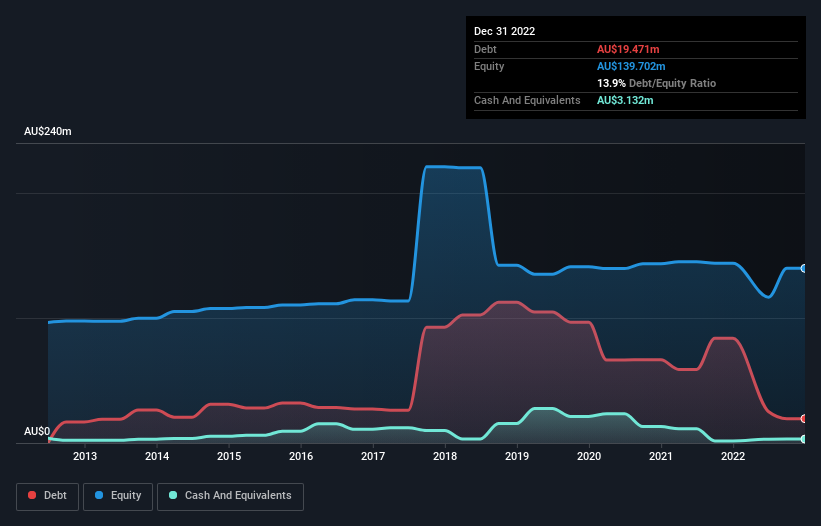Pro-Pac Packaging (ASX:PPG) Has Debt But No Earnings; Should You Worry?

Warren Buffett famously said, 'Volatility is far from synonymous with risk.' It's only natural to consider a company's balance sheet when you examine how risky it is, since debt is often involved when a business collapses. We can see that Pro-Pac Packaging Limited (ASX:PPG) does use debt in its business. But is this debt a concern to shareholders?
What Risk Does Debt Bring?
Debt and other liabilities become risky for a business when it cannot easily fulfill those obligations, either with free cash flow or by raising capital at an attractive price. In the worst case scenario, a company can go bankrupt if it cannot pay its creditors. However, a more common (but still painful) scenario is that it has to raise new equity capital at a low price, thus permanently diluting shareholders. Of course, the upside of debt is that it often represents cheap capital, especially when it replaces dilution in a company with the ability to reinvest at high rates of return. When we think about a company's use of debt, we first look at cash and debt together.
Check out our latest analysis for Pro-Pac Packaging
How Much Debt Does Pro-Pac Packaging Carry?
As you can see below, Pro-Pac Packaging had AU$19.5m of debt at December 2022, down from AU$83.7m a year prior. On the flip side, it has AU$3.13m in cash leading to net debt of about AU$16.3m.

How Strong Is Pro-Pac Packaging's Balance Sheet?
The latest balance sheet data shows that Pro-Pac Packaging had liabilities of AU$106.2m due within a year, and liabilities of AU$33.3m falling due after that. Offsetting this, it had AU$3.13m in cash and AU$79.3m in receivables that were due within 12 months. So its liabilities total AU$57.1m more than the combination of its cash and short-term receivables.
The deficiency here weighs heavily on the AU$36.3m company itself, as if a child were struggling under the weight of an enormous back-pack full of books, his sports gear, and a trumpet. So we definitely think shareholders need to watch this one closely. At the end of the day, Pro-Pac Packaging would probably need a major re-capitalization if its creditors were to demand repayment. The balance sheet is clearly the area to focus on when you are analysing debt. But ultimately the future profitability of the business will decide if Pro-Pac Packaging can strengthen its balance sheet over time. So if you're focused on the future you can check out this free report showing analyst profit forecasts.
Over 12 months, Pro-Pac Packaging reported revenue of AU$400m, which is a gain of 23%, although it did not report any earnings before interest and tax. Shareholders probably have their fingers crossed that it can grow its way to profits.
Caveat Emptor
Despite the top line growth, Pro-Pac Packaging still had an earnings before interest and tax (EBIT) loss over the last year. Its EBIT loss was a whopping AU$14m. Considering that alongside the liabilities mentioned above make us nervous about the company. It would need to improve its operations quickly for us to be interested in it. Not least because it had negative free cash flow of AU$5.5m over the last twelve months. So suffice it to say we consider the stock to be risky. When analysing debt levels, the balance sheet is the obvious place to start. However, not all investment risk resides within the balance sheet - far from it. We've identified 3 warning signs with Pro-Pac Packaging (at least 2 which can't be ignored) , and understanding them should be part of your investment process.
Of course, if you're the type of investor who prefers buying stocks without the burden of debt, then don't hesitate to discover our exclusive list of net cash growth stocks, today.
New: Manage All Your Stock Portfolios in One Place
We've created the ultimate portfolio companion for stock investors, and it's free.
• Connect an unlimited number of Portfolios and see your total in one currency
• Be alerted to new Warning Signs or Risks via email or mobile
• Track the Fair Value of your stocks
Have feedback on this article? Concerned about the content? Get in touch with us directly. Alternatively, email editorial-team (at) simplywallst.com.
This article by Simply Wall St is general in nature. We provide commentary based on historical data and analyst forecasts only using an unbiased methodology and our articles are not intended to be financial advice. It does not constitute a recommendation to buy or sell any stock, and does not take account of your objectives, or your financial situation. We aim to bring you long-term focused analysis driven by fundamental data. Note that our analysis may not factor in the latest price-sensitive company announcements or qualitative material. Simply Wall St has no position in any stocks mentioned.
About ASX:PPG
Pro-Pac Packaging
Manufactures and distributes flexible and industrial packaging products in Australia and New Zealand.
Slight and slightly overvalued.
Market Insights
Community Narratives



